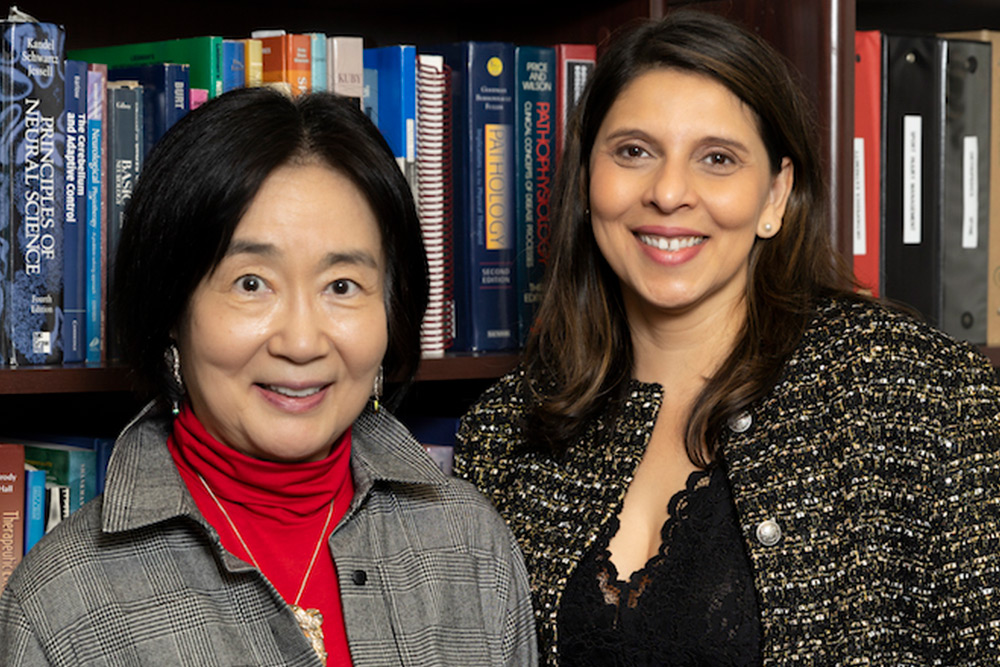New Research Underscores UI Health’s Commitment to Health Equity for Marginalized and Underserved Communities
Research at UI Health is shedding light on disparities in health outcomes for historically marginalized communities. From children experiencing an array of poor health outcomes, to how African American women receive treatment for breast cancer to disparities among Alzheimer’s disease and types of dementia, our experts are working to bring equitable access to excellence for the patients and communities we serve.
New Center Aims to Transform Dementia Care and Promote Diversity in Research Heading link

The new Center for Health Equity in Cognitive Aging co-directed by Naoko Muramatsu, PhD, MHSA, professor of community health sciences in the School of Public Health and Tanvi Bhatt, PhD, associate professor of physical therapy and professor of rehabilitation services in the College of Applied Health Sciences aims to transform the approach to dementia care. Funded by a $3 million grant from the National Institute of Aging, the center seeks to uncover the challenges faced by caregivers of dementia patients from various underrepresented groups.
As the baby boomer generation reaches old age, the number of people with Alzheimer’s disease and types of dementia is growing rapidly. Without effective treatments, these diseases will place an uneven burden on individuals and families in underrepresented populations, including ethnic, racial, gender and socioeconomic groups who have received less attention in aging research. The center strives to address both the needs of individuals with dementia and the experiences of their caregivers. It’s an initiative that emphasizes the inclusion of diverse research perspectives to combat inequity in cognitive aging care.
“This center is about social and behavioral science research on aging and that needs to include all of our departments and colleges,” Professor Muramatsu said. “This is an opportunity for us to really work with all parts of campus and engage researchers who may be doing aging research without knowing it. That is the real strength of UIC; it has everything.”
The center, as part of the national Resource Centers for Minority Aging Research, is positioned to play a central role in the network, promoting diversity in research and fostering a team-based community at UIC.
Research Finds Disparities in Cancer Treatment for Black Women Heading link

Additional research indicates that a common test used to decide whether breast cancer patients should get chemotherapy when developing their treatment plan may be informing bad recommendations, leading them to forgo chemotherapy when it might have helped.
Kent Hoskins, MD, Eileen Lindsay Heidrick Professor in the department of medicine and associate director of translational research at the University of Illinois Cancer Center and senior author of the study, emphasized the need for caution in using race-neutral cutoffs when recommending treatments due to biological differences. The team is examining whether these disparities are due in part to Black women’s tumors responding less favorably to estrogen-blocking pills, a common treatment for this cancer type.
As part of a body of work looking at outcomes for Black women who have estrogen receptor-positive tumors, researchers have identified a potential bias in the 21-gene breast recurrence score test, the standard biomarker test for estrogen receptor-positive breast cancer, which may result in Black women receiving inadequate chemotherapy recommendations. The analysis of more than 70,000 records revealed that the test often underestimates the benefits of chemotherapy for Black women, potentially leading to missed treatment opportunities, particularly for younger patients.
Dr. V.K. Gadi, MD, PhD, professor in the department of medicine and deputy director of the Cancer Center noted, “When we looked at Black women in the United States, they were having worse results for all levels of stages and diagnoses.” Dr. Gadi continued, “that’s because, based on the test results, some patients were told they would likely not benefit from chemo, when in actuality, they may have.”
The investigation also questions whether social determinants and structural racism contribute to more aggressive tumor biology in Black women. The forces driving health care inequities may be the same ones causing biological differences in tumors. This comprehensive work to identify these kinds of health care disparities we see affecting Black women is part of UI Health’s overall efforts to counter the effects of our health care system’s biases and to deliver solutions.
Study Identifies Lower Quality Care for Children in Marginalized Communities Heading link

An additional study revealed that minority children may experience subpar healthcare compared to others, convening a multi-institutional investigation to understand these inequities. Faculty from the University of Illinois College of Medicine collaborating with Northwestern University and the Ann & Robert H. Lurie Children’s Hospital, contributed to a recently published study in the medical journal The Lancet which looked at health outcomes for children in marginalized communities. The study identified lower quality care for these children in emergency medicine, inpatient and critical care, surgery, developmental disabilities, mental health care, endocrinology and more.
“There are deeply entrenched racial disparities that span broad sectors of U.S. society and transcend generations,” noted Monique Jindal, MD, MPH, assistant professor of clinical medicine. “These lead to, among other disadvantages, stark inequities in health care for children from minority racial and ethnic groups. It is abundantly clear that to ensure every child in the U.S. receives the best possible health care, there is a critical need for far-reaching policy changes that directly address deep-rooted structural racism at its core.”
Dr. Jindal has focused on five key systems that contribute to structural racism — housing, employment, health insurance, immigration and criminal justice. “We wanted to understand, given that context, what are the policy levers that we can use to mitigate those health inequities.”
The study also identified a relative lack of research into the experiences of Asian American and Native American pediatric patients, as well as children classified as belonging to multiple racial or ethnic groups. Researchers said more investigations of those racial groups are needed.
The research conducted across UIC and the academic health enterprise spotlight the inequities experienced by our communities. Through in-depth knowledge, interprofessional collaborations, and translational science, the research and clinical teams at UI Health are focused on improving the quality of health for the individual patient as well as the broader population.